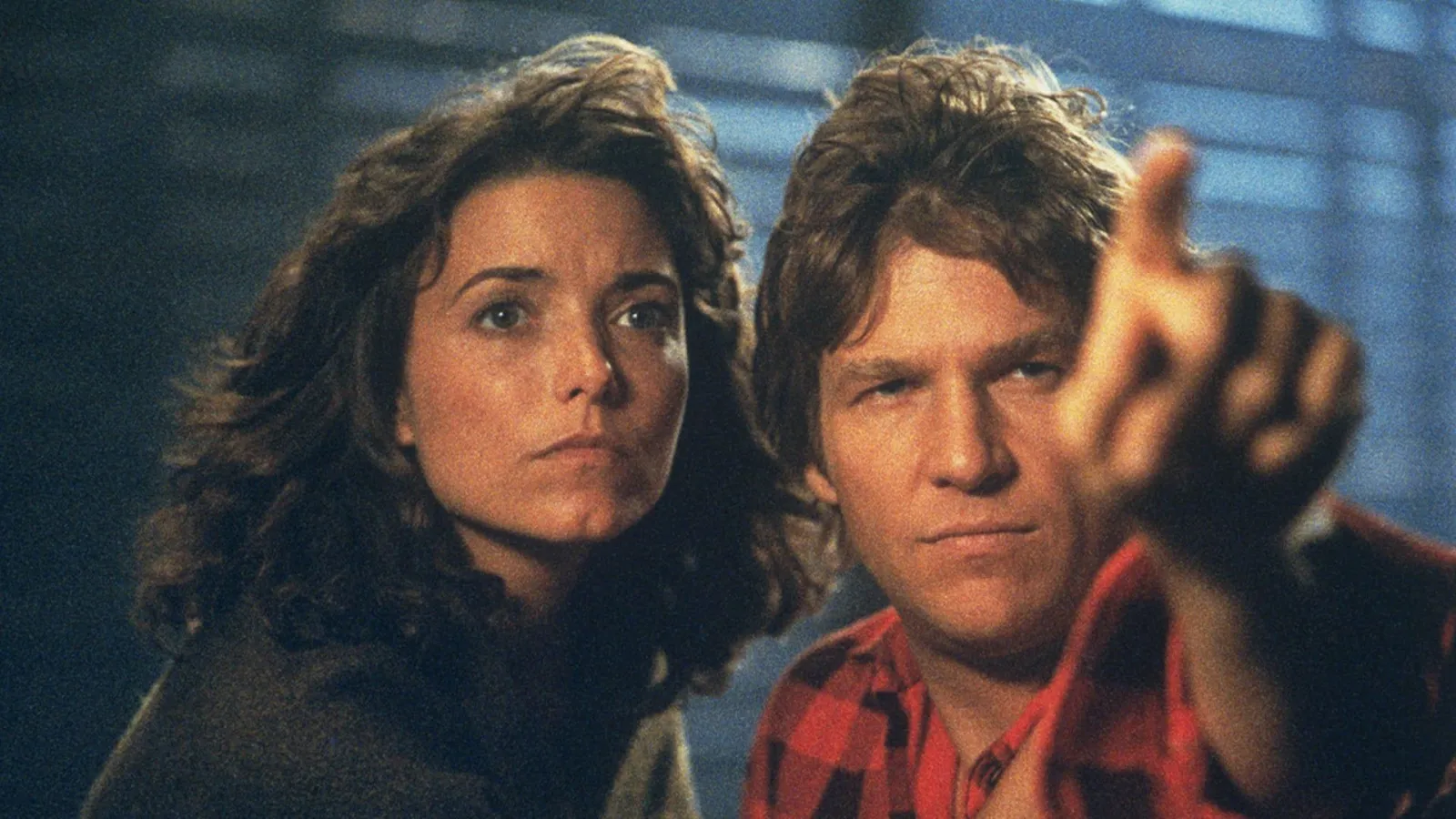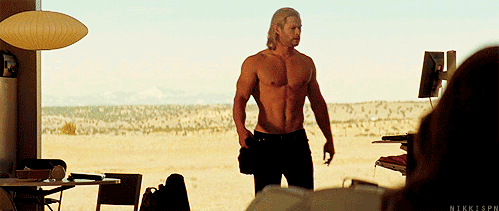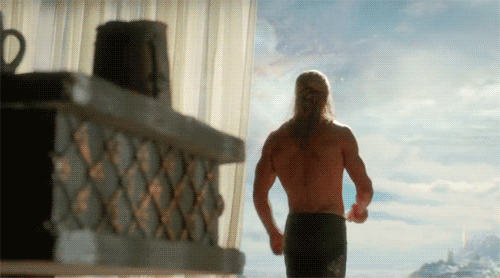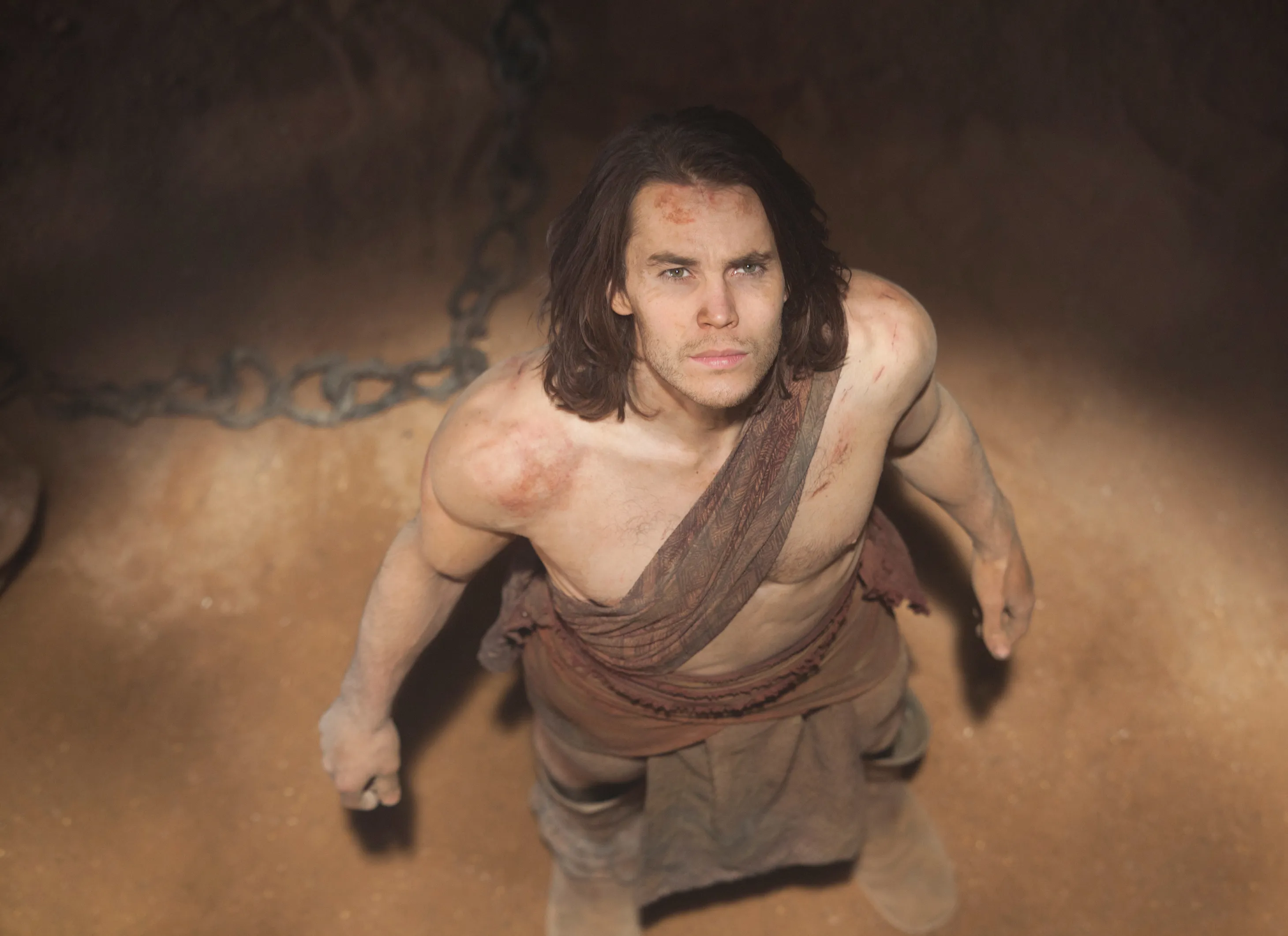
Today we're revisiting the "Born Sexy Yesterday" trope (coined by the YouTuber, Pop Culture Detective) but selecting for examples in sci-fi films that reverse the conventional gender roles and make the male subject the naive, dependent and — in some cases, sexualized —counterpart. You might notice that it is a rather short list, far shorter than the list of "BSY" female leads out there. The fact that these examples are so few and far between is the precise reason I wanted to dig into this trope reversal so badly. I want to dissect why it is that this relationship dynamic might be challenging to write and even harder to sell to mainstream audiences. Questions I'd like you to keep in mind include:
a) Is there a reverse male gaze (a.k.a. "female gaze," objectifying men for women's pleasure)?
b) Does the desire to return home excuse a male protagonist's violence against the woman harboring him?
1. Starman (dir. John Carpenter, 1984)
< Click above image to watch trailer >
Synopsis: "Answering a NASA message intended for aliens, a space being tries to contact mankind, but an American missile grounds his ship. Scrambling, the so-called Starman (Jeff Bridges) inhabits the body of a late Wisconsinite and kidnaps the dead man's widow, Jenny Hayden (Karen Allen). Determined to reunite with a vessel from his home planet at a predetermined site, Starman and Jenny travel to Arizona. Pursued by military officials trying to kill him, Starman forges a lasting bond with Jenny."
Starman is the definitive "Himbo" from Outer-space. In case you haven't watched the video first: In Pop Culture Detective's video essay he breaks down the BSY (born sexy yesterday) trend in which adult female characters with exaggerated sexual appeal possess childlike naïveté. Or as the video cites from Tron: Legacy (dir. Joseph Kosinski, 2010): "Profoundly naive yet unimaginably wise." In this line of dialogue Jeff Bridges' character, Clu the video game creator is describing Olivia Wilde's character, Quorra an AI made manifest as a physically mature but not socially or emotionally mature woman.

Promotional stills for Tron: Legacy (2010). Left, Garrett Hedlund as Sam Flynn & Olivia Wilde as Quorra;
Right, Jeff Bridges as Clu
What is so troubling about this trope is not just the infantilizing of adult female characters and the predatory undertones that come with that (this unfortunately is not new to cinema history). What is equally disquieting is the necessity to isolate that female character with whichever average man she happened upon after manifesting as a baby in a grown-woman's body for the sole purpose of preserving her perception that he is the most incredible man this new world has to offer. Pop Culture Detective suggests that this stems from a fantasy where men do not have to do or be remarkable in any way and can still win the affection of a remarkable woman who happens to have no sexual history or frame of reference for casting judgement upon the male character (projection/self-identification for the male viewer).
Pop Culture Detective goes on to cite Starman (incidentally, also starring Jeff Bridges) as an example disproving the existence of a reverse male gaze, stating that:
"(the women) do not love them because of their immaturity but despite it."
What he means here is that in contrast to BSY female characters — whose lack of experience is idealized by the male gaze — a lack of sexual experience or grasp of societal norms more broadly is not idealized whatsoever in BSY male characters. Instead this shortcoming is the central obstacle to be overcome which makes the primary objective of the female character to encourage learning and experience, not to isolate the BSY male in order to protect her own ego.

Still from Starman (1984). Left, Jeff Bridges as Starman; Right, Karen Allen as Jenny Hayden.
Does that mean that men cannot be objectified or sexualized in real life or on-screen. No, they most certainly can and I will provide examples where their objectification is apparent. In this case, however, given the opportunity to rebuild a life with her seemingly reincarnated dead husband, Jenny chooses not to initiate a sexual relationship with the clueless Starman. She, rather, prioritizes his wellbeing and mission to return home. It is only after spending time on Earth and learning our customs that Starman makes a romantic advance towards Jenny.
Stills from Starman (1984).
Now, does Starman's prerogative to find his way home justify holding Jenny at gun-point for the first half of the movie? Surely there are better ways of going about that but when your grasp of Earthly languages is limited to a handful of greetings you're only left with persuasive actions. Incidentally it didn't take him long to learn how persuasive gun-point can be. Was it extremely difficult to watch a woman get abducted by a strange man wearing the skin of her deceased husband? Yes, that was very difficult but considering the protagonist's circumstances it was necessary.
Stills from Starman (1984).
2. The Man Who Fell To Earth (dir. Nicolas Roeg, 1976)
< Click above image to watch trailer >
Synopsis: "Thomas Jerome Newton (David Bowie) is an alien who has come to Earth in search of water to save his home planet. Aided by lawyer Oliver Farnsworth (Buck Henry), Thomas uses his knowledge of advanced technology to create profitable inventions. While developing a method to transport water, Thomas meets Mary-Lou (Candy Clark), a quiet hotel clerk, and begins to fall in love with her. Just as he is ready to leave Earth, Thomas is intercepted by the U.S. government, and his entire plan is threatened."
The aforementioned film title "Starman" is probably familiar to you as the 1972 hit song by David Bowie. In his dramatic acting debut in The Man Who Fell To Earth Bowie takes on the Starman persona and runs with it. The film is a fabulous blend of experimental film techniques with traditional narrative structure. Bowie's iconic androgynous style and public persona offers an instructive complication to our conjecture about gender roles and objectification of on-screen subjects. His character is not the hyper-masculine hero that sci-fi fans are familiar with like Harrison Ford's character Han Solo from the Star Wars franchise or Bruce Willis' character Korben Dallas from The Fifth Element (dir. Luc Besson, 1997).
Left, still from The Man Who Fell To Earth (1976), Candy Clark as Mary-Lou; Right, promotional, David Bowie as Thomas Jerome Newton.
Bowie's character, Thomas is suave in a manner that is very in touch with his feminine side. His unique allure and dazzling intelligence captivates business partners and his love interest, Mary-Lou alike. Thomas grows exceedingly agitated and neurotic as the clock ticks on his mission to return home to his family with stores of water. These tensions are taken out primarily on Mary-Lou who poses no material threat to that mission. His behavior appears to be driven, rather, by a sense of superiority over her (and humanity more broadly) and helplessness against the circumstances that imperil his wife and children back home and that strand him here on Earth.
So, to revisit those initial two questions: No, this case does not prove that there is a reverse male gaze. The primarily objectified and sexualized character is the female love interest Mary-Lou. Unlike in Starman (1984) the violence towards his love interest is in no way necessitated by his mission to return home so again, no, his behavior toward the woman harboring him is certainly not excused.
3. The Brother From Another Planet (dir. Jon Sayles,1984)
< Click above image to watch trailer >
Synopsis: "An escaped slave from an alien planet lands in New York City and tries to adapt
to life on the streets of Harlem, where he gets a job as a repair man due to his amazing abilities at fixing machines. Meanwhile, he's pursued by two agents from his home world who are intent on returning there with him."
Joe Morton, the lead actor, reflected on this pivotal role in his career during an interview on the talk show Live Kelly and Mark. He said that while preparing for the role he would observe babies, puppies or any being going through an experience for the first time:
"I tried to look at anybody or study anyone who was going through first-time experiences like a baby because this is a guy from another planet who comes here and he looks like he should know what's going on — and he doesn't — and he has to experience the world anew if you will. So to watch babies to watch puppies to watch anyone who was going through a new experience..."
Morton's performance had no spoken lines whatsoever. Everything he communicated was through facial expressions and physical gestures. Award for best performance of alien-ness on this list certainly goes to him. In the entire history of sci-fi cinema thus far he's neck-and-neck with Milla Jovovich as Leeloo in The Fifth Element (1997).

The power dynamic at play in this film is not so much a romantic one but instead a racial one. This film also features the first on-screen portrayal of the infamous "Men in Black" urban legend. Unlike the first two examples, this protagonist left his planet with zero intention of returning and his conflict is with pursuers from his home planet that would forcibly remove him, not Earthlings trying to withhold him. The setting of the film in Harlem is central to the plausibility of the Black-presenting alien hiding in plain sight. It is Black Americans' collective suspicion of White men in black suits asking too many questions that provides our protagonist the sanctuary he needs. It is then his unique skills as an electronics repair man that provides him an avenue for socialization with those that recognize him as one of their own.
Poster for Men In Black (dir. Barry Sonnenfeld, 1997)

He becomes infatuated with a jazz singer he sees on a poster all over town and saves up enough money to see her perform at a night club. She strikes up conversation with him first and later asks him to see her as herself and not as "the singer." She would rather be chosen for her true self than be idolized or deceive him.
Left, Joe Morton as The Brother; Right, Dee Dee Bridgewater as Malverne Davis
While this example contradicts the notion of a reverse male gaze it does challenge another convention in sci-fi: substitution of Black or other POC experience with a sci-fi metaphor and casting an alienated group of beings mostly or all with White actors. Instead the Black experience is actually front and center in a sci-fi story with a Black male lead. Our protagonist's mission to remain free needs no excuses or justifications, he must be free by any means necessary. It just so happens that he does not take out any frustrations on those that harbor and protect him from his pursuers.
4. Thor (dir. Kenneth Branagh, 2011)
< Click above image to watch trailer >
Synopsis: "The powerful but arrogant god Thor is cast out of Asgard to live amongst humans in Midgard (Earth), where he soon becomes one of their finest defenders."
Regular readers of my blog are probably familiar with my enthusiasm for this movie and the Thor franchise more broadly. If you haven't already I recommend you check out my Jane Foster blogpost which discusses her role in the MCU as the unifying force between hard science and mysticism. What is especially distinct in this example is that regardless of whom is dependent upon who (Thor upon Jane for knowledge of Earth or Jane upon Thor for knowledge of the cosmos) one's circumstantial advantage is never used to exploit the other.
Assistance is always given willingly and enthusiastically. Thor is eager to answer Jane's questions about astronomy and where he comes from, despite Jane accidentally hitting him with her car a couple of times. Jane is never held at gunpoint the way Jenny is in Starman and Thor is never withheld by Jane (on purpose anyway, she didn't mean to hit him with her car! Twice...). Like Jenny, however, Jane goes out of her way to aid the alien man in his escape from Earth.
Bottom: Left, Natalie Portman as Jane Foster; Right, Chris Hemsworth as Thor Odinson.
On the point of a reverse male gaze, this film began a Thor franchise tradition of self-aware comedic scenes featuring a shirtless Chris Hemsworth. The observation of this trend is what got my gears turning on the question of a reverse male gaze in the first place. I don't think the romantic relationship between Thor and Jane turns him from a subject into an object. I do, however, think this is a clear example of objectifying a man on screen for the pleasure of the audience, notably the female members.
Left to Right: Chris Hemsworth as Thor Odinson in the first, second and third movies of the Thor franchise.
5. John Carter (dir. Andrew Stanton 2007)
< Click above image to watch trailer >
Synopsis: "When Civil War veteran John Carter (Taylor Kitsch) mysteriously awakes on the surface of Mars -- also called Barsoom -- he little expects the adventure that awaits him. Carter reluctantly becomes embroiled in an epic conflict among the red planet's inhabitants, including Tars Tarkas (Willem Dafoe) and Princess Dejah Thoris (Lynn Collins). As Barsoom is poised on the brink of collapse, war-weary Carter rediscovers his humanity when he realizes that everyone's fate is in his hands."
This is the first example on our list featuring a male lead that is an Earthling stranded on an alien planet as opposed to an alien man stranded on Earth. What I really love about this example is how it adds another layer of reversal to the romantic dynamic. It's like when you play Uno and put a reverse card on top of another reverse card. John Carter is by no means a clueless himbo from the audience's perspective (assuming all the viewers are fellow Earthlings). He's actually a very clever and resourceful Civil War veteran. But from the perspective of his love interest Dejah Thoris and the other people of Barsoom (a.k.a. Mars), he comes across as a handsome idiot until he adapts to his new surroundings.
Left image: Taylor Kitsch as John Carter; Right image: Left, Ciarán Hinds as Tardos Mors and Lynn Collins as Dejah Thoris.

This story does a great job illustrating how relative social and survivalist competency is. Charles Darwin's concept of: "Survival of the fittest" is often misconstrued to mean the most physically strong or to have the most dominant personality. What Darwin really means here is most suitable for a given environment. Taylor Kitsch's embodiment of John Carter is clearly one of a notably fit human but not exceptionally so compared to the other warriors on Mars. What gave him his exceptional leaping and fighting skill in the Martian environment was the difference of bone density and lack of gravity relative to what he is accustomed to on Earth.
Frank Frazetta illustration for "Warlord of Mars" by Edgar R. Burroughs.

In keeping with the style of the sword & sandal genre and Frank Frazetta's cover art for the book, "A Princess of Mars" by Edgar Rice Burroughs, originally released in 1912, John Carter's costuming shows off his athletic prowess and fearlessness. On Earth his garb would be quite scandalous for the time of the book's release but in the deserts of the red planet he fits right in.
Relative to other characters I would not say that John Carter is objectified for the gratification of the audience. The PG-13 Disney movie does all that it can to make the original material suitable for its target audience.
Frank Frazetta cover art for "A Princess of Mars" by Edgar R. Burroughs (1970's edit.)

Final question: is John Carter's hostility to Dejah Thoris justified when she deliberately obstructs his mission to return home? Yes, I believe it is. He does not become violent towards her or actively put her in harms way by prioritizing his return home. She is deceitful about her intentions to help him in favour of her own cause. When she stops stalling him and finally reveals how to operate the alien device that can get him home she returns to him the freedom to choose: return to Earth or fight for Barsoom.
Lynn Collins as Dejah Thoris
Let's tally up the answers to those two questions posed at the beginning of our quest:
a) Is there a reverse male gaze (a.k.a. "female gaze," objectifying men for women's pleasure)?
1. Starman: NO
2. The Man Who Fell To Earth: NO
3. The Brother From Another Planet: NO
4. Thor: YES
5. John Carter: NO
The results are 1/5, or 20%, so while a reversal of the male gaze is not impossible it is still uncommon, even among instances where the BSY gender roles are reversed.
b) Does the desire to return home excuse a male protagonist's violence against the woman harboring him?
1. Starman: YES
2. The Man Who Fell To Earth: NO
3. The Brother From Another Planet: N/A
4. Thor: N/A
5. John Carter: YES
I wouldn't call John Carter's refusal to take up arms an act of violence but for this discussion I'll include it as an example of hostility towards the female screen partner. The results come in at 2/5, or 40%, showing that this power dynamic or conflict occurs far more often than the objectification of the male subject in these same BSY movies. Of course this is a very small sample but the trend seems to suggest that even when gender roles are reversed in the BSY dynamic, victimization and disempowerment do not reverse proportionately. Studios must be assuming that general audiences are not prepared to see male leads patronized and belittled to the same extent that female leads often are because it might emasculate the character the audience is intended to identify with.
Interestingly, the same concern hasn't been shown for the audience's identification with female leads or female supporting characters or how male-female interactions on screen might impact what behavior we normalize in our day to day lives. I am not advocating for misandry or revenge narratives. I am more interested in seeing more complex depictions of femininity and masculinity as seen in David Bowie's portrayal of Thomas Jerome Newton in The Man Who Fell To Earth (1976), Joe Morton's portrayal of The Brother in The Brother From Another Planet (1984), Natalie Portman's portrayal of Jane Foster in Thor (2011) and Lynn Collins' portrayal of Dejah Thoris in John Carter (2012).




























コメント